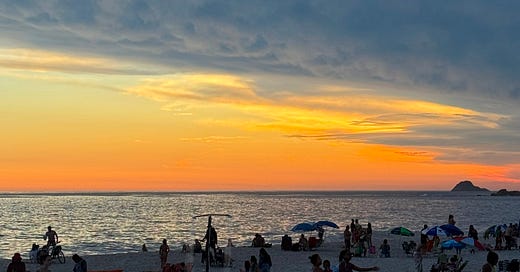The vacation ideal
The most absorbing memories had two qualities: Simplicity and serendipity.
On the final day of my week-long trip to Rio de Janeiro — which only while there did I learn means River of *January* — I found myself across the bay in Niteroi, a leafy, less inspiriting suburb akin to Arlington, Virginia, biding hours until the dreaded return flight with an odious 1:45 a.m. takeoff time. Walking across a busy avenue to catch the $1 ferry back, my boyfriend posed a halfway serious question with his trademark tongue-in-cheek tenor: “What do you hope to get out of a vacation, David?” “New experiences,” I replied, lamely, which he instantly but respectably dismissed as underwhelming enough an answer to terminate the topic of conversation before our sneakers hit the opposite sidewalk. Still, the question nagged at me like a botanical garden mosquito bite as I labored through the 12-hour journey home, touching down in Bogota before finally descending into the tortuously inconvenient and soulless D.C. international airport named not even for a president, but a measly secretary of state.
Vacations are a test of logistical mastery, personal patience and whether one can suppress the mystery and possibility immersed in the future in order to savor and relish the present. Most of us live mentally in the future, planning and striving and waiting for when we’ll finally get to what really matters, as if what we’re currently partaking in is just transit with a glowing turnstile in the distance. “The idea of the future, pregnant with an infinity of possibilities, is thus more fruitful than the future itself,” wrote the French philosopher Henri Bergson, “and this is why we find more charm in hope than in possession, in dreams than in reality.” So even if sitting beachside at sunset with dear friends along one of the most beautiful vistas in the southern hemisphere, gin and tonics with limes in hand for a third of the price of any city in America, the internet invites exposure to vastly more potential uses of your time than what’s right in front of you, as the author Oliver Burkeman explains in “Four Thousand Weeks.” The urge to look away from the fierce oranges and deep pinks streaking across wispy clouds in the Brazilian sky has become embarrassingly normal. And practically, there’s a dinner to plan and Google Maps is needed to pinpoint the restaurant downtown, Uber is required to preschedule the ride and iMessage is vital for coordinating with the friend who stayed back at the hotel. So during this exercise you reflexively slide over to your email … it’ll just take a few seconds … and begin scrolling to locate some message that indicates your importance back inside reality you spent thousands to flee and anticipated for months. The slice of life before you is happening. The email is the allure to something far away. You take for granted what’s staring at you to peer to the distant other.
I’ve come to find that the tourism part of the vacation is the most dreaded and





